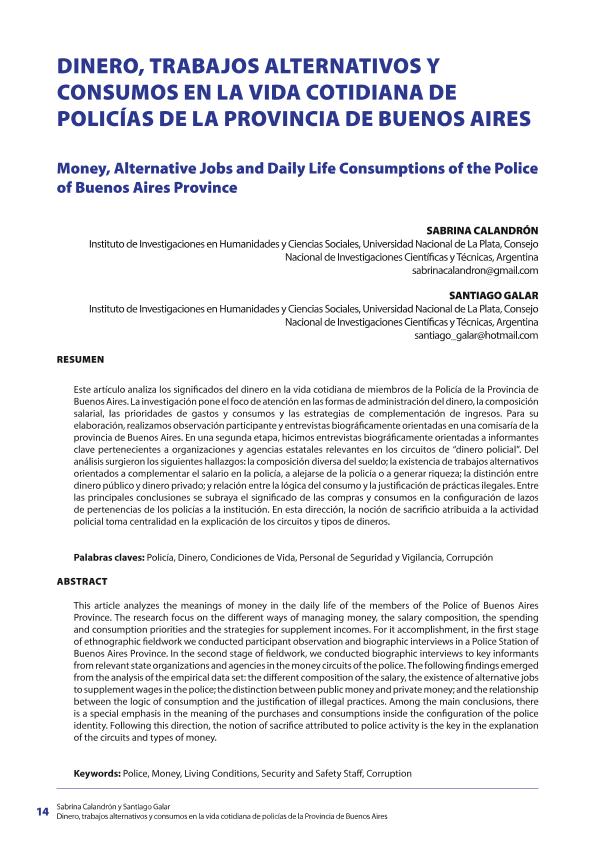Mostrar el registro sencillo del ítem
dc.contributor.author
Calandrón, Julieta Sabrina

dc.contributor.author
Galar, Santiago

dc.date.available
2018-07-16T17:04:31Z
dc.date.issued
2017-12
dc.identifier.citation
Calandrón, Julieta Sabrina; Galar, Santiago; Dinero, trabajos alternativos y consumos en la vida cotidiana de policías de la Provincia de Buenos Aires; Instituto de Desarrollo Económico y Social; Prácticas de Oficio; 2; 20; 12-2017; 14-23
dc.identifier.issn
1851-6076
dc.identifier.uri
http://hdl.handle.net/11336/52197
dc.description.abstract
Este artículo analiza los significados del dinero en la vida cotidiana de miembros de la Policía de la Provincia de Buenos Aires. La investigación pone el foco de atención en las formas de administración del dinero, la composición salarial, las prioridades de gastos y consumos y las estrategias de complementación de ingresos. Para su elaboración, realizamos observación participante y entrevistas biográficamente orientadas en una comisaría de la provincia de Buenos Aires. En una segunda etapa, hicimos entrevistas biográficamente orientadas a informantes clave pertenecientes a organizaciones y agencias estatales relevantes en los circuitos de “dinero policial”. Del análisis surgieron los siguientes hallazgos: la composición diversa del sueldo; la existencia de trabajos alternativos orientados a complementar el salario en la policía, a alejarse de la policía o a generar riqueza; la distinción entre dinero público y dinero privado; y relación entre la lógica del consumo y la justificación de prácticas ilegales. Entre las principales conclusiones se subraya el significado de las compras y consumos en la configuración de lazos de pertenencias de los policías a la institución. En esta dirección, la noción de sacrificio atribuida a la actividad policial toma centralidad en la explicación de los circuitos y tipos de dineros.
dc.description.abstract
This article analyzes the meanings of money in the daily life of the members of the Police of Buenos Aires Province. The research focus on the different ways of managing money, the salary composition, the spending and consumption priorities and the strategies for supplement incomes. For it accomplishment, in the first stage of ethnographic fieldwork we conducted participant observation and biographic interviews in a Police Station of Buenos Aires Province. In the second stage of fieldwork, we conducted biographic interviews to key informants from relevant state organizations and agencies in the money circuits of the police. The following findings emerged from the analysis of the empirical data set: the different composition of the salary, the existence of alternative jobs to supplement wages in the police; the distinction between public money and private money; and the relationship between the logic of consumption and the justification of illegal practices. Among the main conclusions, there is a special emphasis in the meaning of the purchases and consumptions inside the configuration of the police identity. Following this direction, the notion of sacrifice attributed to police activity is the key in the explanation of the circuits and types of money.of ethnographic fieldwork we conducted participant observation and biographic interviews in a Police Station of Buenos Aires Province. In the second stage of fieldwork, we conducted biographic interviews to key informants from relevant state organizations and agencies in the money circuits of the police. The following findings emerged from the analysis of the empirical data set: the different composition of the salary, the existence of alternative jobs to supplement wages in the police; the distinction between public money and private money; and the relationship between the logic of consumption and the justification of illegal practices. Among the main conclusions, there is a special emphasis in the meaning of the purchases and consumptions inside the configuration of the police identity. Following this direction, the notion of sacrifice attributed to police activity is the key in the explanation
of the circuits and types of money.
dc.format
application/pdf
dc.language.iso
spa
dc.publisher
Instituto de Desarrollo Económico y Social

dc.rights
info:eu-repo/semantics/openAccess
dc.rights.uri
https://creativecommons.org/licenses/by-nc/2.5/ar/
dc.subject
Policía
dc.subject
Dinero
dc.subject
Condiciones de Vida
dc.subject
Personal De Seguridad y Vigilancia
dc.subject
Corrupción
dc.subject.classification
Otras Sociología

dc.subject.classification
Sociología

dc.subject.classification
CIENCIAS SOCIALES

dc.title
Dinero, trabajos alternativos y consumos en la vida cotidiana de policías de la Provincia de Buenos Aires
dc.title
Money, Alternative Jobs and Daily Life Consumptions of the Police of Buenos Aires Province
dc.type
info:eu-repo/semantics/article
dc.type
info:ar-repo/semantics/artículo
dc.type
info:eu-repo/semantics/publishedVersion
dc.date.updated
2018-07-11T20:22:16Z
dc.journal.volume
2
dc.journal.number
20
dc.journal.pagination
14-23
dc.journal.pais
Argentina

dc.journal.ciudad
Ciudad Autónoma de Buenos Aires
dc.description.fil
Fil: Calandrón, Julieta Sabrina. Consejo Nacional de Investigaciones Científicas y Técnicas. Centro Científico Tecnológico Conicet - La Plata. Instituto de Investigaciones en Humanidades y Ciencias Sociales. Universidad Nacional de La Plata. Facultad de Humanidades y Ciencias de la Educación. Instituto de Investigaciones en Humanidades y Ciencias Sociales; Argentina
dc.description.fil
Fil: Galar, Santiago. Consejo Nacional de Investigaciones Científicas y Técnicas. Centro Científico Tecnológico Conicet - La Plata. Instituto de Investigaciones en Humanidades y Ciencias Sociales. Universidad Nacional de La Plata. Facultad de Humanidades y Ciencias de la Educación. Instituto de Investigaciones en Humanidades y Ciencias Sociales; Argentina
dc.journal.title
Prácticas de Oficio
dc.relation.alternativeid
info:eu-repo/semantics/altIdentifier/url/http://ides.org.ar/publicaciones/practicasdeoficio/practicas-de-oficio-investigacion-y-reflexion-en-ciencias-sociales-nro-20
Archivos asociados
